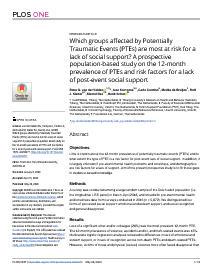Which groups affected by Potentially Traumatic Events (PTEs) are most at risk for a lack of social support? A prospective population-based study on the 12-month prevalence of PTEs and risk factors for a lack of post-event social support
Objectives
Little is known about the 12-month prevalence of potentially traumatic events (PTEs) and to what extent the type of PTE is a risk factor for post-event lack of social support. In addition, it is largely unknown if pre-event mental health problems and loneliness, and demographics are risk factors for a lack of support. Aim of the present prospective study is to fill these gaps in evidence-based knowledge.
Methods
A survey was conducted among a large random sample of the Dutch adult population (i.e. the longitudinal LISS panel) in March-April 2018, and linked with pre-event mental health and loneliness data from surveys conducted in 2016 (n = 5,879). We distinguished four forms of perceived social support: emotional and esteem support, and social recognition and general disapproval.
Results
Loss of a significant other and/or colleague (28%) was the most prevalent 12-month PTE. The 12-month prevalence of violence, accidents and/or, and theft-related events was 13%. Multivariate logistic regression analyses revealed no differences in lack of emotional and esteem support, or in lack of recognition across non-death PTEs and death-related PTEs. However, victims of threat and physical (sexual) violence more often faced disapproval than those affected by burglary and accidents. Results furthermore showed that pre-event mental health problems, pre-event loneliness and stress during the PTE were important independent predictors of forms of support and acknowledgment. Affected individuals with a non-Western background more often lacked support and acknowledgment.
Conclusions
Many adults are confronted with a PTE during a year. In general, pre-event factors and stress during the event are better predictors of a perceived lack of support and acknowledgment than type of event. Early screening programs should especially assess pre-event mental health and loneliness, besides levels of stress during the event, to identify affected people who are at risk for a lack of social support and acknowledgment.
Geachte bezoeker,
De informatie die u nu opvraagt, kan door psychotraumanet niet aan u worden getoond. Dit kan verschillende redenen hebben,
waarvan (bescherming van het) auteursrecht de meeste voorkomende is. Wanneer het mogelijk is om u door te verwijzen naar de bron
van deze informatie, dan ziet u hier onder een link naar die plek.
Als er geen link staat, kunt u contact opnemen met de bibliotheek,
die u verder op weg kan helpen.
Met vriendelijke groet,
Het psychotraumanet-team.
In: Plos One ; ISSN 1932-6203 | 15 | 5 | may | e0232477
https://doi.org/10.1371/journal.pone.0232477
Open Access


